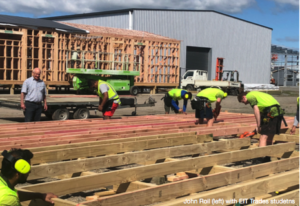Hastings District Council recently signed off a newly created industrial zone south of Hastings as well as negotiating with property owners a palatable development contribution rate, that has enabled construction progress.
Long term property owner John Roil was a key figure in the negotiations and has recommenced construction on two sites and welcomed a couple of new tenants.
John’s son Mark has reinvigorated the Cottages NZ brand under the company name MSR Construction and the business has been benefitting from the uplift in the economy. Cottages NZ has been at the forefront of prefabricated building for over a decade – building houses, holiday homes, worker accommodation and commercial premises.

It has built an additional 800m2 factory and large outdoor concrete pad on the Maraekakaho road fronted site and a large concrete pad outside the existing 600m2 facility.
“We’ve now got the ability to have eight or more buildings under construction at any one time both within a factory setting but also do some of the finishing outside.
The 4 hectare site is also capable of storing up to 40 buildings and also has a consent for a further 1800m2 of factory-style buildings.
John has also developed 4ha in Irongate Road where laser cutting business Axis is based.
A shipping container and scaffolding business has also taken a site while John has plans for a further 1800m2 construction facility on the property.
The road and services into the property has also enabled it to be future proofed with potential for a further four sites.
Further down the road Sunfruit Group has opened a 12,000m2 packhouse and coolstore complex which has created 50 new jobs and more could be added with future expansions.
Other fruit growers have their eyes on Irongate and as reported in the May issue of The Profit, Rockit Global Limited and Bostock New Zealand are likely to build at some stage.
The council’s has stated that its overall vision for the 118-hectare Irongate Industrial Zone is to provide a suitable zone for ‘dry’ industries requiring a large land area and from small to large building areas. The required average lot size is one hectare, with a minimum of 5000m2.
John Roil is still holding out hope that the Hastings Saleyards will relocate from Stortford Lodge to Irongate at some stage in the future.
John suggested the idea over 15 years ago when he presented options to the users of the saleyards. His view hasn’t changed that it would release the existing site to be used for residential or commercial development and enable a modern and future-proof sale yards facility.
“It was a good idea at the time and nothing has changed. It still is, and in fact it might be more relevant to move today with the pressure on residential housing in Hastings.”
